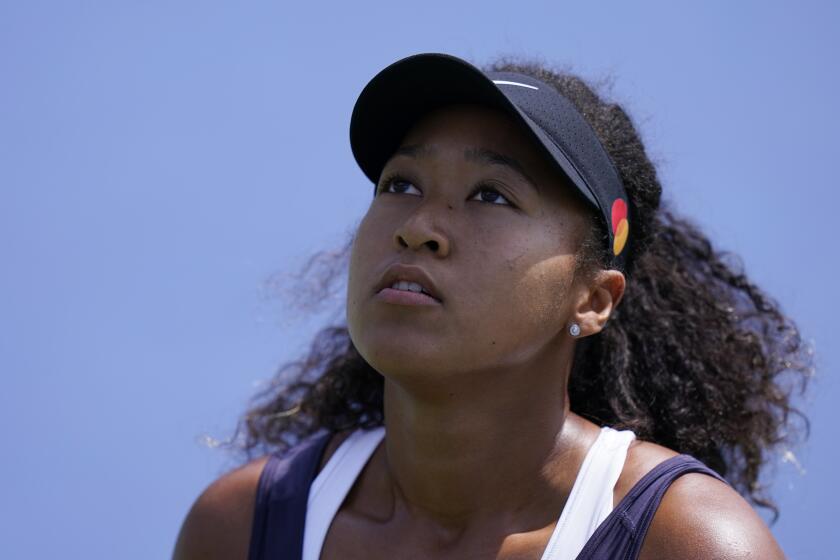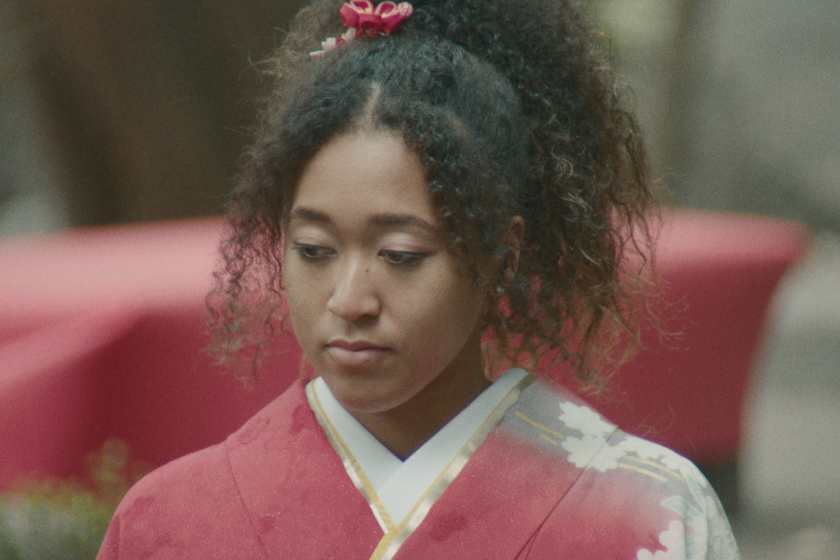Naomi Osaka is staging her comeback. Here’s what a new biography reveals
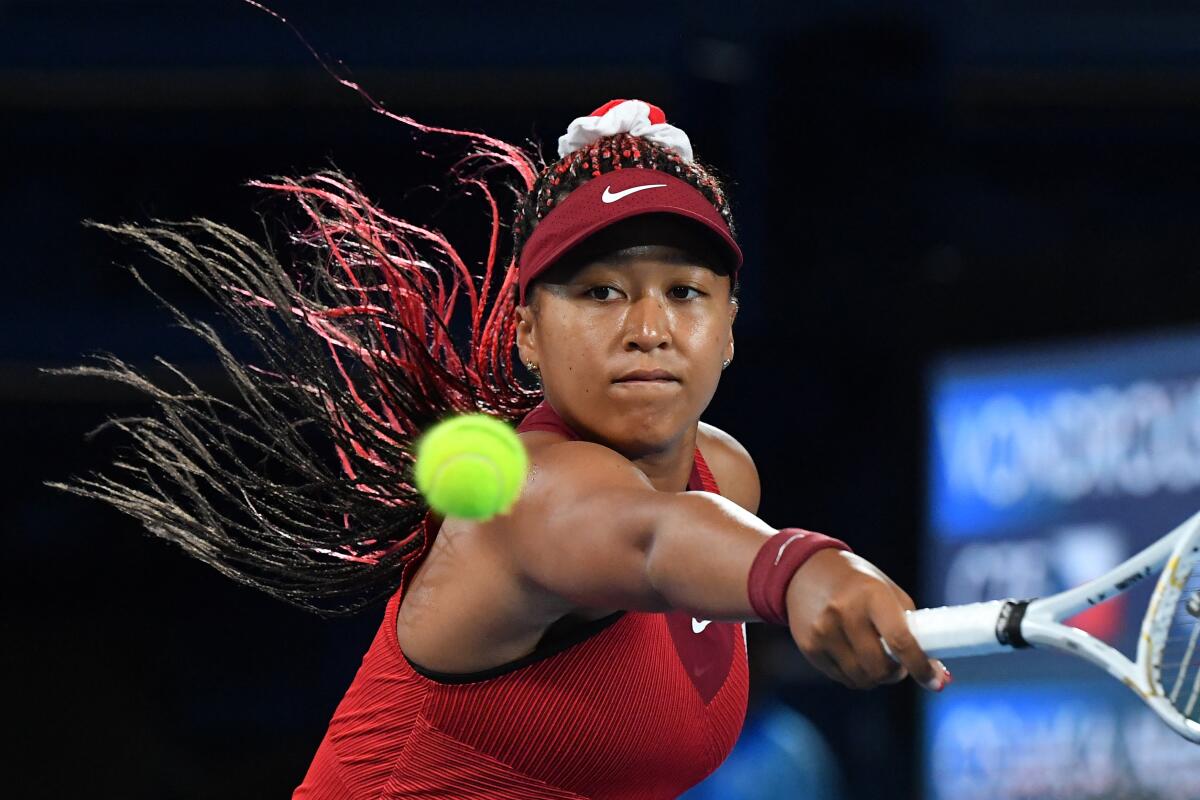
On the Shelf
Naomi Osaka: Her Journey to Finding Her Power and Her Voice
By Ben Rothenberg
Dutton: 496 pages, $35
If you buy books linked on our site, The Times may earn a commission from Bookshop.org, whose fees support independent bookstores.
In 2018, Naomi Osaka emerged from obscurity to win the BNP Paribas Open at Indian Wells, Calif., charming the tennis world with her shy but relatable winner’s speech. That fall, her fame spread into popular culture when she stunned her idol Serena Williams at the U.S. Open finals. During the controversial match, Williams exploded in self-righteous fury at officiating decisions, briefly turning the crowd against Osaka and leaving her in tears even in victory.
The headlines, Osaka’s steep climb and her mixed Japanese and Haitian heritage propelled her to the top in endorsement money. In 2020, she again expanded her reach by writing forcefully about racism after George Floyd’s murder, then using her clout to force a one-day boycott in protest over Jacob Blake’s shooting.
Naomi Osaka’s courage following the Jacob Blake shooting, likely lost on most while wildcat player strikes spread across team sports, shouldn’t be overlooked.
After winning her second U.S. and Australian Opens, Osaka then walked away from the 2021 French Open rather than answer questions at post-match news conferences. Her statements about mental health earned her plaudits and attacks. Then, after struggling with focus and injuries, she left the tour completely in 2023 to have her first child.
After plunging from No. 1 in the world to nearly 700th, Osaka will be back at the Australian Open starting Jan. 14 — a new twist in her story that coincides with a new book by Ben Rothenberg, “Naomi Osaka: Her Journey to Finding Her Power and Her Voice.”
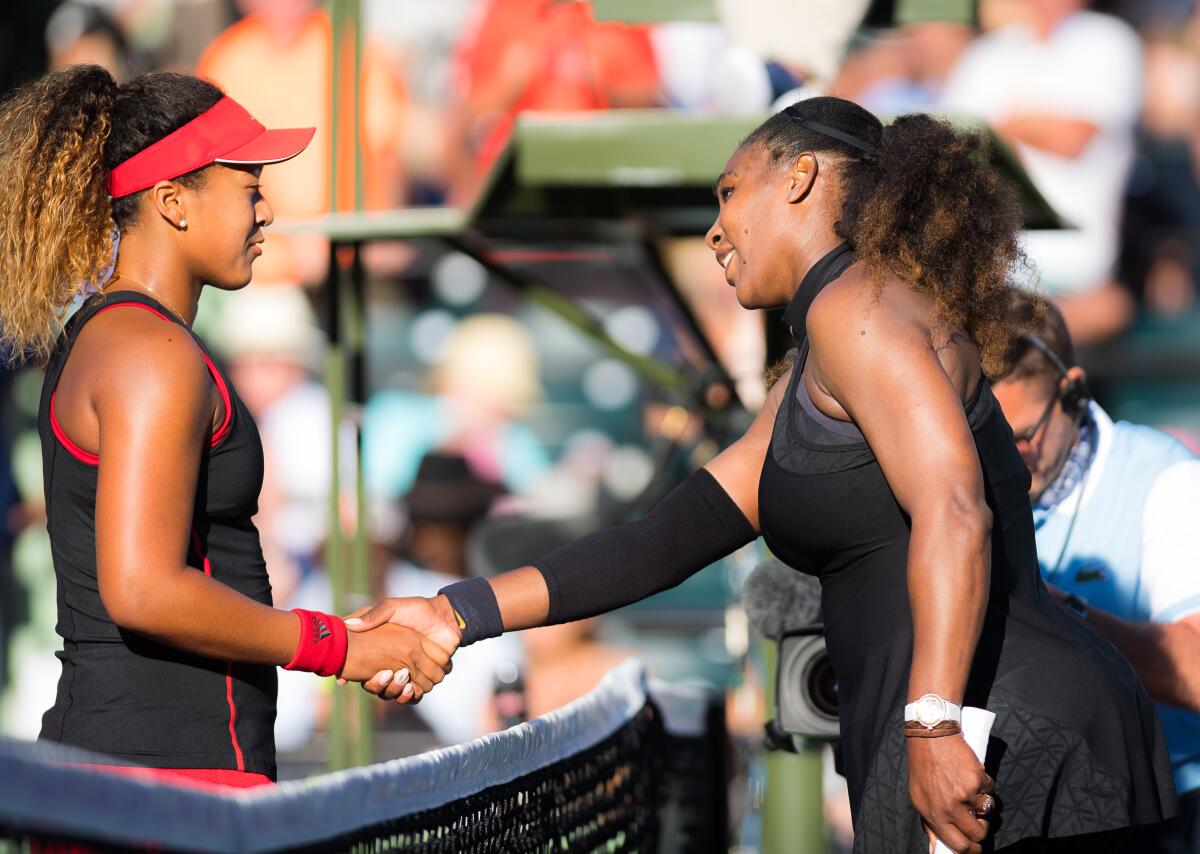
“Naomi is incredibly bold and strong but can be shy and fragile,” says Rothenberg, who covered tennis for the New York Times for years and now is senior editor of Racquet magazine and co-host of the “No Challenges Remaining” podcast.
Speaking by video from his home in Washington, D.C., Rothenberg says Osaka and her family were cooperative but often kept him “at arm’s length,” adding, “this book was my idea, not Naomi’s or her team’s.”
“People will come away from this sympathetic about certain things but not others,” he adds. “I think the book is fair, but it’s certainly not sugarcoated.” Our interview has been edited for length and clarity.
The poet, essayist and author, most recently, of “Just Us,” discusses the evolving movement toward racial justice with Professor Marcus Anthony Hunter.
More than most athletes, Osaka has had such an eventful five years, on and off the court.
Even though she only recently turned 26, she’s had such an incredibly full life. But for someone of her stature and her public resonance, I felt like there was still a lot that was unknown about her and a lot to uncover and to understand.
There were smaller incongruous things — as a child, she had acted in her father’s independent movies, and it’s surreal to see this Grand Slam champion who we think of as being very shy as a child actress. But there was also her family’s financial peril. I had some sense of it, but seeing the scope of the family’s poverty — a lot of that self-inflicted as they chased this long-shot tennis dream — helped me understand the adult Naomi, her motivations and her struggles.

Osaka’s parents strived to follow the Williams family model, but [Naomi’s older sister] Mari never attained tennis glory. What does that tell us about how the system works?
The detour into Mari’s life is one of my favorite parts of the book. She had the same ambition from her parents, made the same sacrifices as Naomi, had the same lost childhood, but there’s none of the payoff. She got to 280th in the world, which is objectively good, but she wasn’t even close to breaking even from prize money.
And those are the more common stories. Plenty of people try this with very mixed, sometimes sad and sometimes tragic [results]. For every breakthrough like Naomi, there’s all those who didn’t make it and are left with the rubble of their career.
The newsworthy tennis phenom is the subject of an atmospheric Netflix docuseries. It will leave you feeling as though you’ve gotten to know her.
You quote Osaka talking about how her world was limited to her family and coaches. Maybe she would naturally have been shy and anxious, but the solitary nature of tennis and that lifestyle could not have helped.
She went to online school after long days on the court. And growing up with so few people around her, she always valued their opinions, so when the whole world was talking about her, she thought all their opinions mattered too. She did not have the tools to cope because she had been so sheltered. That had a long term impact on her. That’s a broader problem for many tennis players. Some feel ill-prepared for dealing with the real world. You don’t have a ton of grounding or perspective outside the lines.
Being well-rounded and being a tennis player are not mutually exclusive but not mutually beneficial either. They can repel each other at times. The things that make you a great tennis player don’t serve you well in life.
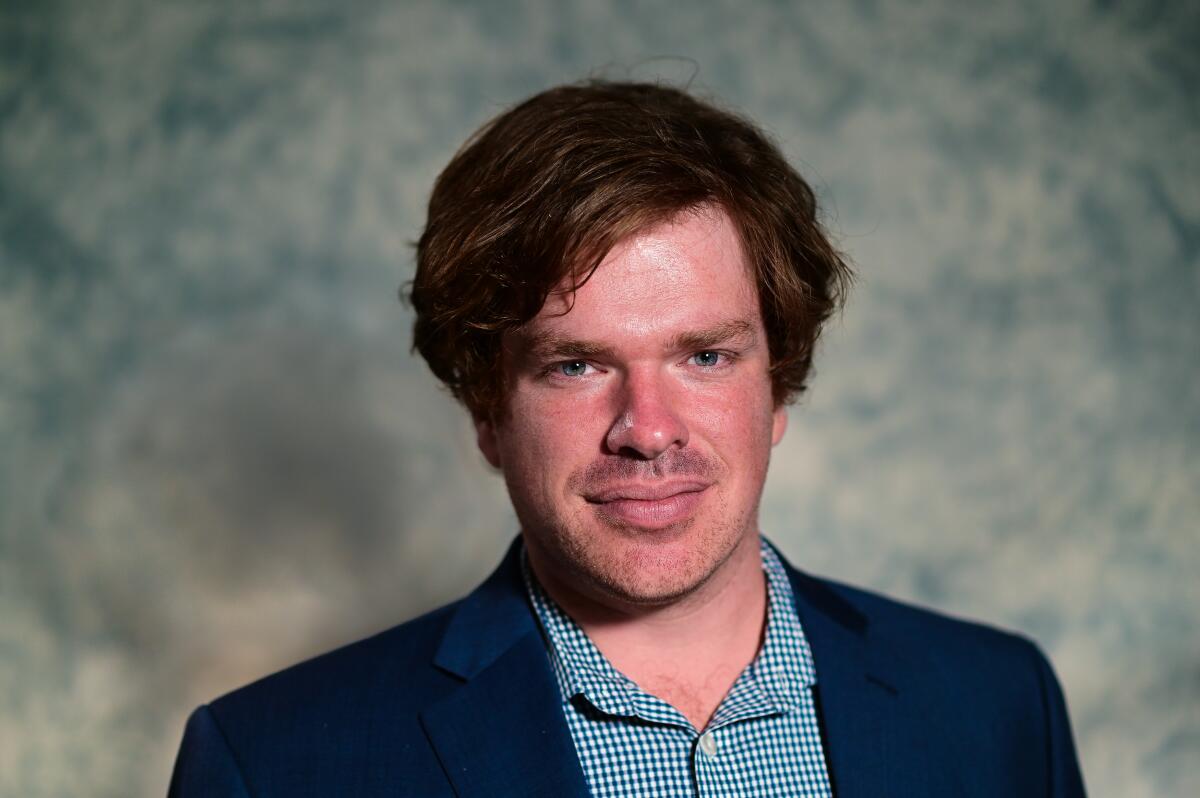
She also became a star in the age of social media.
The first time I interviewed her, she said the Internet had raised her. But she also really found her voice and courage online. Most of her boldest statements have been typed, not spoken out loud.
Her unwillingness to speak at French Open press conferences earned her both admirers and critics — and not just along political lines. You quote Daria Abromowicz, sports psychologist for No. 1-ranked Iga Swiatek, who says Osaka’s choice to speak out on mental health without ever seeing a therapist was “irresponsible.”
There were certainly mental health professionals applauding her creating mental health awareness, but others were more apprehensive about someone like her being the torch bearer [for mental health issues]. It wasn’t until almost a full year after the French Open [that] she had therapy, while players like Swiatek were doing more rigorous work all that time.
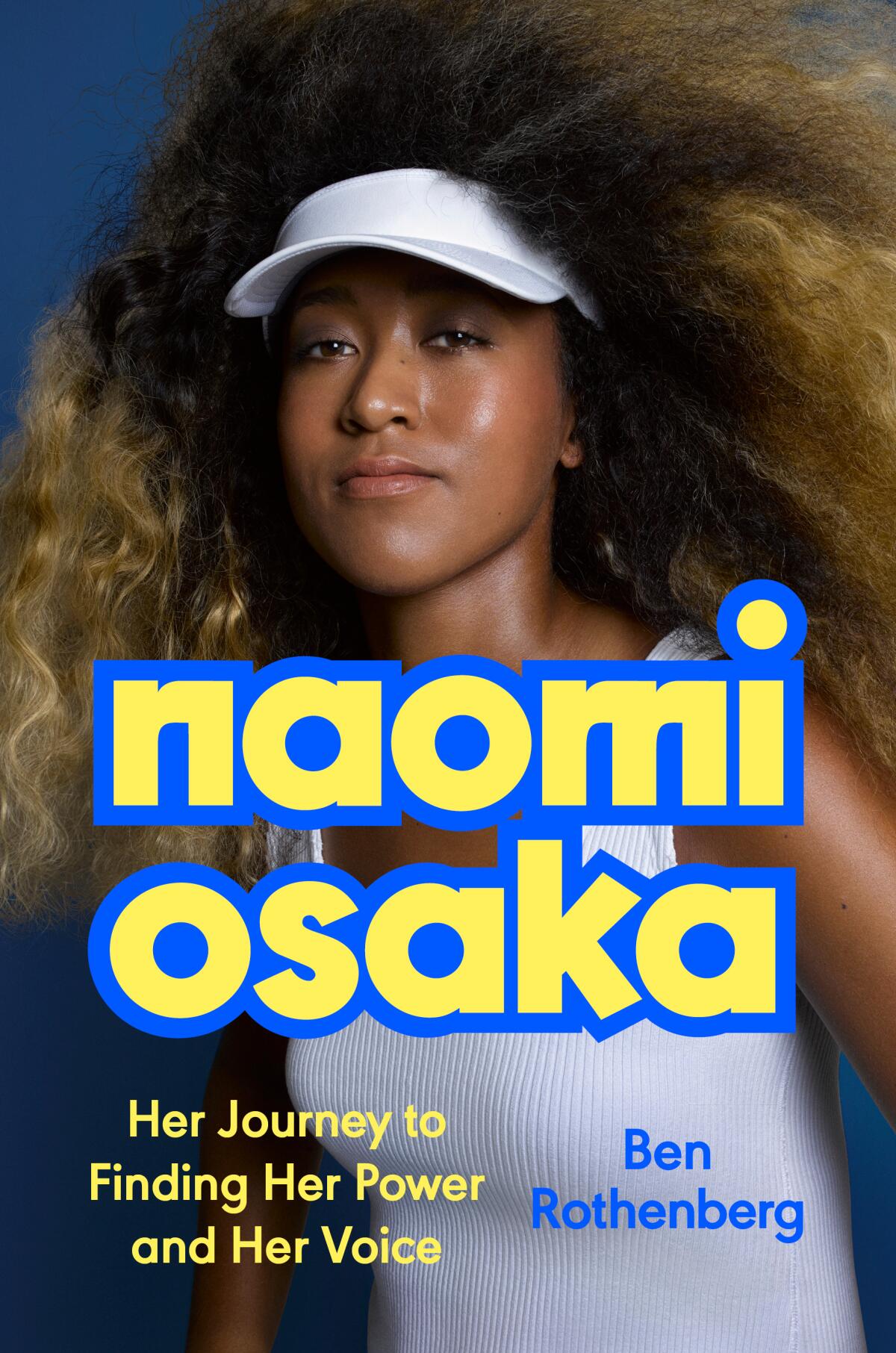
After all this time off, what can we expect from her at the Australian Open? Will she be a legitimate threat again later on in this year’s tour?
The confidence is high, and her fitness looks good. But the rust is certainly going to be thick. She needs to get her rankings up. Women’s tennis has so many unexpected results that Naomi winning the tournament wouldn’t be the biggest shock in the world. But I think it’ll take a couple of tournaments to get her sea legs back. By Indian Wells [in April], I think she should be looking good.
Are there more Grand Slams in her future?
She has stated the goal of winning eight more, which was a wildly bold thing to state out loud — setting this bar so high when winning one more after this kind of absence would be objectively fantastic. But she’s still ambitious and still has that hunger in her from when she was a kid that she still has not switched off.
More to Read
Sign up for our Book Club newsletter
Get the latest news, events and more from the Los Angeles Times Book Club, and help us get L.A. reading and talking.
You may occasionally receive promotional content from the Los Angeles Times.
